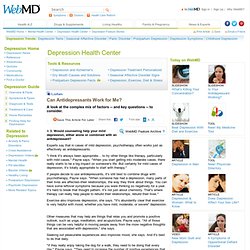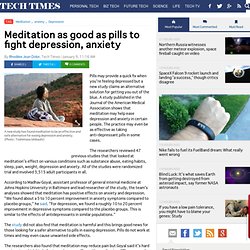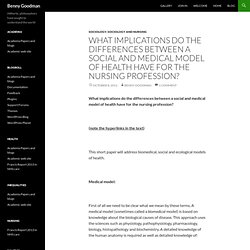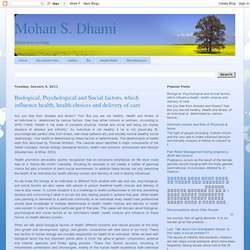

Antidepressants: Effectiveness, Trials, Realistic Expectations. A look at the complex mix of factors -- and key questions -- to consider.

Why do I need to register or sign in for WebMD to save? We will provide you with a dropdown of all your saved articles when you are registered and signed in. A 3. Would counseling help your mild depression, either alone or combined with an antidepressant? Experts say that in cases of mild depression, psychotherapy often works just as effectively as antidepressants. "I think it's always been appropriate… to try other things like therapy, particularly with mild cases," Payne says. If people decide to use antidepressants, it's still best to combine drugs with psychotherapy, Payne says. Exercise also improves depression, she says. Continue reading below... Other measures that may help are things that relax you and promote a positive outlook, such as yoga, meditation, and acupuncture, Payne says.
Seeking out pleasurable experiences also improves mood, she says. Meditation as good as pills to fight depression, anxiety. A new study has found meditation to be an effective and safe alternative for easing depression and anxiety.

(Photo : Toshimasa Ishibashi) Pills may provide a quick fix when you're feeling depressed but a new study claims an alternative solution for getting you out of the blue. A study published in the Journal of the American Medical Association shows that meditation may help ease depression and anxiety in certain people. The practice may even be as effective as taking anti-depressant pills in some cases. The researchers reviewed 47 previous studies that that looked at meditation's effect on various conditions such as substance abuse, eating habits, sleep, pain, weight, depression and anxiety. According to Madhav Goyal, assistant professor of general internal medicine at Johns Hopkins University in Baltimore and lead researcher of the study, the team's analyses showed that meditation has positive effects on anxiety and depression. . © 2014 Tech Times, All rights reserved. BTEC National Health and Social Care - Beryl Stretch. What implications do the differences between a social and medical model of health have for the nursing profession?
What implications do the differences between a social and medical model of health have for the nursing profession?

(note the hyperlinks in the text) This short paper will address biomedical, social and ecological models of health. Medical model: First of all we need to be clear what we mean by these terms. A medical model (sometimes called a biomedical model) is based on knowledge about the biological causes of disease. . · Aetiology (in the United States they spell it Etiology). · Epidemiology. · Signs and Symptoms. · Diagnosis. · Investigations and clinical examinations. · Treatment options and management plans for a very wide range of conditions and diseases.
The focus is often on the individual ill patient, and it seeks to cure through the application of medications and/or surgery. Many doctors in practice however adapt and supplement this basic approach to consider issues such as lifestyle, patient preferences and wishes in their treatment options. (source: (Source: adapted from Jones, 1994 in. Www.scie.org.uk/publications/briefings/files/briefing19.pdf. Health and Social Care. What Is the Biomedical Model? Mohan S. Dhami: Biological, Psychological and Social factors, which influence health, health choices and delivery of care. Are you free from disease and illness?

Yes! But you are not healthy. Health and illness of an individual is determined by various factors, they may either intrinsic or extrinsic. According to WHO (1948) "Health is the state of complete physical, mental and social well being not merely absence of disease and infirmity.” An individual is not healthy if he is not physically fit, psychologically perfect (free from stress, well sleep patterns etc) and socially normal (healthy social relationship).
Health promotion advocates quickly recognized that an excessive emphasize on life style could lead to a “blame the victim” mentality. As we know the biology of an individual is different from another with age and sex, psychological, and social factors are also varies with person to person therefore health choices and delivery of care is also varies. First of all 30,000 genes, human genome were widely blamed for illness and well being. The most important biological determinant of health is aging.